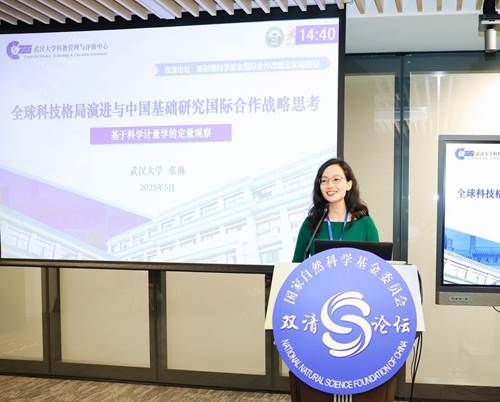The 413th Shuangqing Forum of the National Natural Science Foundation of China (NSFC) was held in Ningbo, Zhejiang from May 26th to 27th. Professor Lin Zhang was invited to deliver a special report.

This issue of the Shuangqing Forum focused on International Cooperation Strategies and Implementation Paths of Science Funds in the New Era. Academician Yang Wei, Director of the Advisory Committee of NSFC, Academician Tao Zhang from the Dalian Institute of Chemical Physics, Chinese Academy of Sciences, and Academician Jie Zhang from Shanghai Jiao Tong University co-chaired the forum. More than 40 experts and scholars from national universities, research institutes, as well as staff from relevant departments such as the Ministry of Science and Technology and NSFC attended the forum, including Academician Tong Zhu from Peking University, Academician Sidao Ni from the Innovation Academy for Precision Measurement Science and Technology, Chinese Academy of Sciences, and Academician Xincheng Xie from the University of Nottingham Ningbo China.
In the report titled Evolution of the Global Scientific and Technological Landscape and China's International Cooperation Strategy for Basic Research: An Empirical Observation Based on Scientometrics, Lin Zhang, based on large-scale data and scientometric methods, started from the evolutionary trends of global scientific and technological forces and systematically analyzed China's role positioning in the international basic research landscape. The report pointed out that although China's basic research output has grown rapidly, there are still structural shortfalls in the fields of medicine and life sciences. Issues such as insufficient international influence and knowledge contribution levels, as well as inadequate reserves of high-end talent and a weak scientific publishing system, also restrict the enhancement of international discourse power.
Regarding the structural evolution and strategic adjustment of China's international cooperation in basic research, Lin Zhang proposed the need to proactively adapt to the global "decentralized" research landscape and reshape the cooperation network. On the one hand, China should build a multilateral cooperation mechanism with itself as the hub, deepen institutionalized collaboration with scientific and technological powers in Europe and America, and strengthen regional cooperation with Asian neighbors and countries in the "Global South". On the other hand, it should optimize the cooperation structure and governance mechanisms, promoting the transformation from shallow formal cooperation to deep substantive cooperation, and encouraging equal consultation, joint goal-setting, and shared achievements. Facing the challenges of cooperation in the new era, it is necessary to implement differentiated international funding strategies, strengthen the joint construction of scientific research infrastructure, and continuously enhance the global attractiveness and strategic initiative of China's research system.
As a high-level strategic academic conference organized by NSFC, the Shuangqing Forum is based on the funding work of science funds, focusing on discussing deep scientific issues of scientific frontiers or national development strategic needs, major basic scientific issues of interdisciplinary integration, and major policies and management issues for the development and improvement of the science fund system. Against the backdrop of the strategy of building a strong scientific and technological country, this issue of the Shuangqing Forum aimed to promote the construction of a globally competitive open system of scientific and technological innovation. It was co-sponsored by the Bureau of International Cooperation, Department of Earth Sciences, Department of International Scientific Research Funding, and Bureau of Planning and Policy of NSFC, and undertaken by the University of Nottingham Ningbo China.